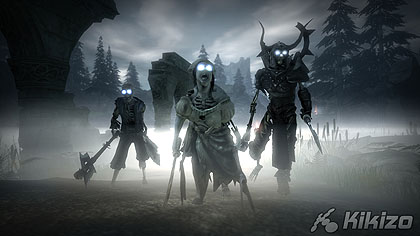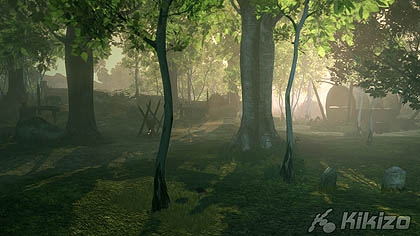Molyneux Interview '08: Fable II & Beyond
Our frank interview about Peter's future as a designer, how he misses PC development, Fable II, and fresh chat on the top-secret Project X - formerly known as Project Dimitri.
Page 2
Kikizo: You've mentioned that one of the player's motives for playing through Fable II is having a well defined, really solid bad guy. What other motives are there?
Molyneux: Yes, as I've talked about the game, there's this idea of freedom. What I realised is that a part of that is the freedom for you to care about things. It's a big thing when you get married and have a family, so part of that motivation is that if you don't get involved enough with the story, your family are going to be, well, pretty depressed that you're not famous. And them wanting you to be famous ends up being motivation. It's a pretty tiny thing, but just the fact that your kid comes up to you - and he's got several dialogues - about wishing that you were more famous that you are, ends up being like a back-end motivation.
Kikizo: It's like fear of rejection or failure...
Molyneux: Yeah, it is. I mean, when you do get a family... I've got a son now, and he's just merciless in the way that he pushes, you know, he'll say, "Daddy, Daddy, I want you to go out and make a truly good game, not any of those rubbish games you've been making." And that means more to me than almost anything. In fact the co-op features, to be honest with you, are purely there in Fable... don't say this because if the team ever saw it they'd probably lynch me... is purely there so I can play a co-op game with my son. And win. [smiles].
Kikizo: I find your comments on cut-scenes and how you hate them interesting. I mean, do you have any research that backs up your claim that most people do skip cut scenes?
Molyneux: I've got no research, but I'm not a fantastic believer in designing around research. The only thing I'll say is, I do it, and I know a lot of other people who do it. And when in Twilight Princess I discovered that skip button, I breathed a sigh of relief. What I did was - and I think this is what most people do - they become their own little editor, their finger is just hovering over that button, to skip on that. And I just think, you know, why not incorporate skipping into the gameplay? So you can skip a cut-scene by just walking away and ignoring someone, or using an expression to tell them to shut up, or even using just the A button to skip to the end - you know, I just want to get to the point, man. And I think a lot of this is because - and I include myself with this especially - I don't think we are particularly good at writing dramatic dialogue. I think if you talk to film people, a lot of the time they say some crass things about, "you know nothing about emotion" - which I don't agree with nowadays - but they do say some interesting stuff about how gamers just aren't patient enough for cut-scenes. You know, "come on, tell me what it is you want out of this".
Kikizo: Of course it's not totally cut-scene free, though...
Molyneux: No, there are four and a half minutes, it's not a lot, but the simple thing is, the golden rule is that any one of these cut scenes shouldn't be long enough for you to actually think about putting this controller down. That opening cut scene you saw with the bird flying through and the boy falling out of the window, that's part of that four and a half minutes. It might actually be four minutes and 49 seconds or something, I don't know, but there's still an incredibly deep story, there's an awful lot to Albion and an awful lot to the back story there, and I didn't want to tell it though conventional cut scenes. When you've got a companion walking with you, they'll be talking about what's been going on in Albion, and it's completely under simulation, so if you do something ridiculous in the middle of them having this chat they'll change their dialogue; if you enter into combat, they'll stop... I always want you to be the hero you want to be, so if you want to break wind or do anything you want while someone is explaining a crucial part of the story, you can, and it will shape the course of the dialogue and change what people think of you.













 Satoru Iwata Video Interview - the late Nintendo president spoke with Kikizo in 2004 as 'Nintendo Revolution' loomed.
Satoru Iwata Video Interview - the late Nintendo president spoke with Kikizo in 2004 as 'Nintendo Revolution' loomed. Kaz Hirai Video Interview - the first of Kikizo's interviews with the man who went on to become global head of Sony.
Kaz Hirai Video Interview - the first of Kikizo's interviews with the man who went on to become global head of Sony. Ed Fries Video Interview - one of Xbox's founders discusses an epic journey from Excel to Xbox.
Ed Fries Video Interview - one of Xbox's founders discusses an epic journey from Excel to Xbox. Yu Suzuki, the Kikizo Interview - we spend time with one of gaming's most revered creators.
Yu Suzuki, the Kikizo Interview - we spend time with one of gaming's most revered creators. Tetris - The Making of an Icon: Alexey Pajitnov and Henk Rogers reveal the fascinating story behind Tetris
Tetris - The Making of an Icon: Alexey Pajitnov and Henk Rogers reveal the fascinating story behind Tetris Rare founders, Chris and Tim Stamper - their only interview? Genuinely 'rare' sit down with founders of the legendary studio.
Rare founders, Chris and Tim Stamper - their only interview? Genuinely 'rare' sit down with founders of the legendary studio. The History of First-Person Shooters - a retrospective, from Maze War to Modern Warfare
The History of First-Person Shooters - a retrospective, from Maze War to Modern Warfare